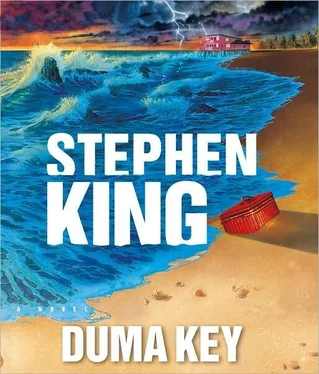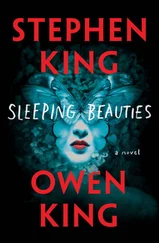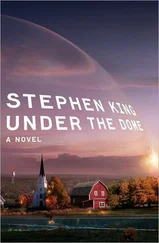“Sure,” I said. “Time and a ha—”
“Ain’t you gone draw nuthin?” Noveen asked, looking at me with those round black eyes. They really were shoebuttons, I was almost sure of it.
“I have nothing to draw,” I said. “Noveen.”
“I tell you sumpin you c’n draw. Whereat yo pad?” Jack was now looking off to the side, into the shadows leading to the ruined parlor, bemused, eyes distant. He looked neither conscious nor unconscious; he looked someplace between.
Wireman let go of me and reached into the food-bag, where I had stowed the two Artisan pads. He handed me one. Jack’s hand flexed a bit, and Noveen appeared to bend her head slightly to study it as I first flipped back the cover and then unzipped the pouch that held my pencils. I took one.
“Naw, naw. Use one of hers.”
I rummaged again, and took out Libbit’s pale green. It was the only one still long enough to afford a decent grip. It must not have been her favorite color. Or maybe it was just that Duma’s greens were darker.
“All right, now what?”
“Draw me in the kitchen. Put me up agin the breadbox, that do fine.”
“On the counter, do you mean?”
“Think I was talkin bout on the flo?”
“Christ,” Wireman muttered. The voice had been changing steadily with each exchange; now it wasn’t Jack’s at all. And whose was it, given the fact that in its prime the only ventriloquism available to make the doll speak had been provided by a little girl’s imagination? I thought it had been Nan Melda’s then, and that we were listening to a version of that voice now.
As soon as I began to work, the itch swept down my missing arm, defining it, making it there . I sketched her sitting against an old-fashioned breadbox, then drew her legs dangling over the edge of the counter. With no pause or hesitation — something deep inside me, where the pictures came from, said that to hesitate would be to break the spell while it was still forming, while it was still fragile — I went on and drew the little girl standing beside the counter. Standing beside the counter and looking up. Little four-year-old girl in a pinafore. I could not have told you what a pinafore was before I drew one over little Libbit’s dress as she stood there in the kitchen beside her doll, as she stood there looking up, as she stood there
Shhhhh —
— with one finger to her lips.
Now, moving quicker than ever, the pencil racing, I added Nan Melda, seeing her for the first time outside that photograph where she was holding the red picnic basket bunched in her arms. Nan Melda bent over the little girl, her face set and angry.
No, not angry—
Scared.
That’s what Nan Melda is, scared near to death. She knows something is going on, Libbit knows something is going on, and the twins know, too — Tessie and Lo-Lo are as scared as she is. Even that fool Shannington knows something’s wrong. That’s why he’s taken to staying away as much as he can, preferring to work on the farm shoreside instead of coming out to the Key.
And the Mister? When he’s here, the Mister’s too mad about Adie, who’s run off to Atlanta, to see what’s right in front of his eyes.
At first Nan Melda thought what was in front of her eyes was just her own imagination, picking up on the babby-uns’ games; surely she never really saw no pelicans or herons flying upside-down, or the hosses smiling at her when Shannington brought over the two-team from Nokomis to give the girls a ride. And she guessed she knew why the little ones were scairt of Charley; there might be mysteries on Duma now, but that ain’t one of em. That was her own fault, although she meant well —
“Charley!” I said. “His name’s Charley!”
Noveen cawed her laughing assent.
I took the other pad out of the food-sack — almost ripped it out — and threw back the cover so savagely that I tore it half off. I groped among the pencils and found the stub of Libbit’s black. I wanted black for this side-drawing, and there was just enough to pinch between my thumb and finger.
“Edgar,” Wireman said. “For a minute there I thought I saw… it looked like—”
“Shut up!” Noveen cried. “Ne’mine no mojo arm! You gone want to see this, I bet!”
I drew quickly, and the jockey came out of the white like a figure out of heavy fog. It was quick, the strokes careless and hurried, but the essence was there: the knowing eyes and the broad lips that might have been grinning with either mirth or malevolence. I had no time to color the shirt and the breeches, but I fumbled for the pencil stamped Plain Red (one of mine) along its barrel and added the awful cap, scribbling it in. And once the cap was there you knew what that grin really was: a nightmare.
“Show me!” Noveen cried. “I want to see if y’got it right!”
I held the picture up to the doll, who now sat straight on Jack’s leg while Jack slumped against the wall beside the staircase, looking off into the parlor.
“Yep,” Noveen said. “That’s the bugger who scared Melda’s girls. Mos’ certainly.”
“What —?” Wireman began, and shook his head. “I’m lost.”
“Melda seen the frog, too,” Noveen said. “The one the babbies call the big boy. The one wit d’ teef . That’s when Melda finally corner Libbit in d’kitchen. To make her talk.”
“At first Melda thought the stuff about Charley was just little kids scaring each other, didn’t she?”
Noveen cawed again, but her shoebutton eyes stared with what could have been horror. Of course, eyes like that can look like anything you want them to, can’t they? “That’s right, sugar. But when she seen ole Big Boy down there at the foot of the lawn, crossin the driveway and goin into the trees…”
Jack’s hand flexed. Noveen’s head shook slowly back and forth, indicating the collapse of Nan Melda’s defenses.
I shuffled the pad with Charley the jockey on it to the bottom and went back to the picture of the kitchen: Nan Melda looking down, the little girl looking up with her finger on her lips — Shhhh! — and the doll bearing silent witness from her place against the breadbox. “Do you see it?” I asked Wireman. “Do you understand?”
“Sort of…”
“Sugar-candy was mos’ly done, once she was out,” Noveen said. “Thass what it come down to.”
“Maybe at first Melda thought Shannington was moving the lawn jockey around as a kind of joke — because he knew the three little girls were scared of it.”
“Why in God’s name would they be?” Wireman asked.
Noveen said nothing, so I passed my missing hand over the Noveen in my drawing — the Noveen leaning against the breadbox — and then the one on Jack’s knee spoke up. As I sort of knew she would.
“Nanny din’ mean nothin bad. She knew they ’us scairt of Charley — this ’us befo the bad things started — an so she tole em a bedtime story to try an make it better. Made it worse instead, as sometimes happens with small chirrun. Then the bad woman come — the bad white woman from the sea — n dat bitch made it worse still. She made Libbit draw Charley alive, for a joke. She had other jokes, too.”
I threw back the sheet with Libbit going Shhhh, seized my Burnt Umber from my pack — now it didn’t seem to matter whose pencils I used — and sketched the kitchen again. Here was the table, with Noveen lying on her side, one arm cast up over her head, as if in supplication. Here was Libbit, now wearing a sundress and an expression of dismay achieved in no more than half a dozen racing lines. And here was Nan Melda, backing away from the open breadbox and screaming, because inside —
Читать дальше










